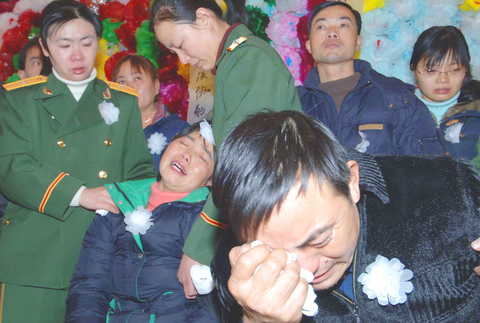An exiled group struggling for an independent homeland in China's far northwest yesterday questioned the motives for a police raid on an alleged Islamist terrorist camp there that left 19 people dead.
China's state-run press announced on Monday that police last week destroyed an Islamic terrorist training camp in the remote Xinjiang region, which is heavily populated by the Muslim Uighur ethnic minority.
Eighteen suspected terrorists and one policeman were killed in a gun battle during the raid, Xinhua news agency said, as it warned of links between the renegade group and Osama bin Laden's al-Qaeda network.

PHOTO: AP
The alleged training camp belonging to the so-called East Turkestan Islamic Movement was located in the Pamir mountain region bordering Pakistan and Afghanistan, Xinhua cited Xinjiang police spokesman Ba Yan as saying.
Xinhua said the group may have infiltrated the region with al-Qaeda's help, as it reported that 22 hand grenades were seized and evidence uncovered of the group attempting to produce up to 1,500 more such devices.
An exiled Uighur organization that has been seeking independence in Xinjiang yesterday doubted the veracity of the report.
It also accused Beijing of using the global war on terror to renege on promises of autonomy for the restive region.
"We do not know what happened in this village, except for the Chinese government version," said Alim Seytoff, the Washington-based executive chairman of the World Uighur Congress. "The Chinese government has failed to provide substantial evidence to the international community to prove it is facing an international terrorist threat."
"For all we know, this may have been something artificially created by the Chinese government to prove the terrorist threat," he said.
But Zhao Yongchen (趙永琛), China's vice head of the Xinjiang anti-terrorist force, said the threat of terrorism was real and maintained that up to 160 people had been killed in Xinjiang by terrorists over the past "several dozen years."

‘TERRORIST ATTACK’: The convoy of Brigadier General Hamdi Shukri resulted in the ‘martyrdom of five of our armed forces,’ the Presidential Leadership Council said A blast targeting the convoy of a Saudi Arabian-backed armed group killed five in Yemen’s southern city of Aden and injured the commander of the government-allied unit, officials said on Wednesday. “The treacherous terrorist attack targeting the convoy of Brigadier General Hamdi Shukri, commander of the Second Giants Brigade, resulted in the martyrdom of five of our armed forces heroes and the injury of three others,” Yemen’s Saudi Arabia-backed Presidential Leadership Council said in a statement published by Yemeni news agency Saba. A security source told reporters that a car bomb on the side of the road in the Ja’awla area in

PRECARIOUS RELATIONS: Commentators in Saudi Arabia accuse the UAE of growing too bold, backing forces at odds with Saudi interests in various conflicts A Saudi Arabian media campaign targeting the United Arab Emirates (UAE) has deepened the Gulf’s worst row in years, stoking fears of a damaging fall-out in the financial heart of the Middle East. Fiery accusations of rights abuses and betrayal have circulated for weeks in state-run and social media after a brief conflict in Yemen, where Saudi airstrikes quelled an offensive by UAE-backed separatists. The United Arab Emirates is “investing in chaos and supporting secessionists” from Libya to Yemen and the Horn of Africa, Saudi Arabia’s al-Ekhbariya TV charged in a report this week. Such invective has been unheard of

‘SHOCK TACTIC’: The dismissal of Yang mirrors past cases such as Jang Song-thaek, Kim’s uncle, who was executed after being accused of plotting to overthrow his nephew North Korean leader Kim Jong-un has fired his vice premier, compared him to a goat and railed against “incompetent” officials, state media reported yesterday, in a rare and very public broadside against apparatchiks at the opening of a critical factory. Vice Premier Yang Sung-ho was sacked “on the spot,” the state-run Korean Central News Agency said, in a speech in which Kim attacked “irresponsible, rude and incompetent leading officials.” “Please, comrade vice premier, resign by yourself when you can do it on your own before it is too late,” Kim reportedly said. “He is ineligible for an important duty. Put simply, it was

US President Donald Trump on Saturday warned Canada that if it concludes a trade deal with China, he would impose a 100 percent tariff on all goods coming over the border. Relations between the US and its northern neighbor have been rocky since Trump returned to the White House a year ago, with spats over trade and Canadian Prime Minister Mark Carney decrying a “rupture” in the US-led global order. During a visit to Beijing earlier this month, Carney hailed a “new strategic partnership” with China that resulted in a “preliminary, but landmark trade agreement” to reduce tariffs — but